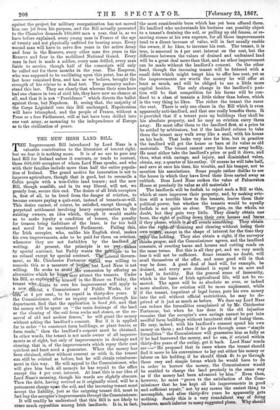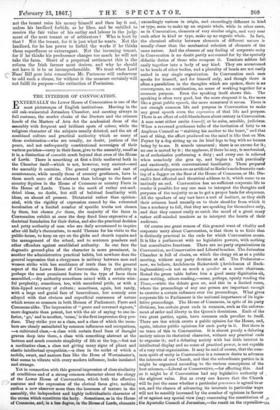THE NEW IRISH LAND BILL.
THE Improvement Bill introduced by Lord Naas is a valuable contribution to the literature of tenant right, but we fear it is nothing more. It is of no use to pass any land Bill for Ireland unless it contents, or tends to content, those 600,000 occupiers of whom Lord Naas speaks, and who with their families include more than half the entire popula- tion of Ireland. The grand motive for innovation is not to improve agriculture, though that is good, but to reconcile a Celtic people with a non-Celtic land tenure ; and the new Bill, though sensible, and in its way liberal, will not, we greatly fear, secure this end. The desire of all Irish occupiers is, first of all, to be freed from the danger of eviction, to become owners paying a quit-rent, instead of tenants-at-will. This desire cannot, of course, be satisfied, except through a perpetual settlement involving heavy compensation to the existing owners, an idea which, though it would enable us to make loyalty a condition of tenure, the penalty for treason being forfeiture of the lease, is far too bold and novel for an unreformed Parliament. Failing this, the Irish occupier, who, unlike his English rival, makes his own improvements, asks to be paid for them on eviction, whenever they are not forbidden by the landlord writing. At present, the principle is no by special contract, but Paddy wants the PaT-61ess no refusal except by special contract. T ment, as Mr. Chichester Fortescue s ciple to be iberal Govern- d, was willing to concede this as a measure of juesti, but Lord Naas is not willing. He seeks to avoid},k, e concession by offering an alternative which he hopormay attract the tenants. Under his Bill, as explaiuny himself in the House on Friday, the tenant wilt:LT/lints to own his improvement will apply to a new: 41'1'.emcial, a Commissioner of Public Works, for a - at 4 per cent., to be repaid in thirty-five years. If egor-:" the Commissioner, after an inquiry conducted through his department, find that the application is bond fide, and that the money will be spent on "the main drainage of the land or the clearing of the soil from rocks and stones, or the re- moval of old and useless fences," he will grant the money without asking the landlord's consent. But if it is applied for in order "to construct farm buildings, or plant fences, or form roads," then the landlord's cousent must be obtained. In other words, the tenant is not made owner of all improve- ments as of right, but only of improvements in drainage and clearing, that is, of the improvements which repay their cost quickest and least need a guarantee. When the money has been obtained, either without consent or with it, the tenant can still be evicted as before, but he will obtain reimburse- ment in this way. He will appeal to the Commissioner, who will give him back all moneys he has repaid to the office except the 4 per cent. interest. At least this is our idea of Lord Naas's meaning, though his words are slightly obscure. Then the debt, having revived as it originally stood, will be a permanent charge upon the soil, and the incoming tenant must accept the liability, just as the outgoing tenant did, must in fact buy the occupier's improvements through the Commissioner. It will readily be understood that this Bill is not likely to rouse much opposition among Irish landlords. It is, in fact, the most considerable boon which has yet been offered them. No landlord who understands his business can possibly object to a tenant's draining the soil, or pulling up old fences, or re- moving stones at his own expense, for all those improvements tend to a direct increase of value, will in fact usually enable the owner, if he likes, to increase his rent. The tenant, it is true, is amerced in 4 per cent. interest on the cost, but the difference between the values of drained and undrained land will be a great deal more than that, and no other improvement can be made without the landlord's consent. On the other hand, though the incoming tenant will be fettered with a small debt which might tempt him to offer less rent, yet as the improvements are worth the money' he will %offer at least as much, and will be obliged to use a little "more capital besides. The only change in the landlord's posi- tion will be that competition for his farms will be con- fined to a class of tenants a little richer than before, which is the very thing he likes. The richer the tenant the surer the rent. There is only one clause in the Bill which is even apparently anti-landlord, and that one really benefits them. It is provided that if a tenant puts up buildings they Shall be his absolute property, and he may on eviction cony them away. He must offer them to the landlord first, at a price to be settled by arbitrators, but if the landlord refuses to take them the tenant may walk away like a snail, with his house on his back. That looks very nice for him, but in practice the landlord will get the house or barn at its value as old materials. The tenant cannot carry his house away bodily. He must either take the landlord's price or pull it down, and thus, what with cartage, and injury, and diminished value, obtain, say, a quarter of his outlay. Of course he will take half, and save at once his time, his trouble, and his temper, not to mention his associations. Some people rather dislike to see the house in which they have lived their lives carted away as rubbish. Does Lord Naas reckon the value of Palmerston House at precisely its value as old materials V The landlords will be foolish to reject such a Bill as this, which at once improves their property, and, by making evic- tion still a terrible blow to the tenants, leaves them their political power, but whether the tenants would be equally foolish is not quite so clear. They gain, on the whole, no doubt, but they gain very little. They clearly obtain one boon, the right of pulling down their own houses and barns thinks proper, and the Commissioner agrees, and he landlord t h e _ their if they please, which isigisti events something. -The obtain also the righ4-8&-diaining and clearing without lain own mselef, except in the shape of interest for the time they . oy the holding. They also obtain a right, if tsurveyor consents, of erecting barns and houses and cutting roads on the same terms. But this is all they get, and we very much fear it will not be sufficient. Some tenants, no doubt, will avail themselves of the offer, and some good will in that way be done. A good deal of land will, for example, be drained, and every acre drained is equal to an acre and a half in fertility. But the general sense of insecurity, which is the bane of Irish agricultural life, will not be re- moved. The agent will be as absolute as ever, or indeed more absolute, for eviction will be more unpleasant, while if the tenant, impatient of legal forms, puts his own money into the soil without official restrictions, he may be de- prived of it just as much as before. We dare say Lord Naas can reduce the formalities complained of by Mr. Chichester Fortescue, but when he has done it the old injustice remains that the occupier's own savings cannot be put into needful farm buildings without imminent risk of losing them. He may, indeed, with his landlord's consent spend his own money on them ; and then if he goes through some "simple formalities" the Commissioner will guarantee him as fully as if he had borrowed the money, and he can, if evicted within thirty-five years of the outlay, get it back. Lord Naas' words are :—" He proposed that in cases where the tenant should find it more to his convenience to lay out either his money or labour on his holding, if he should think fit to go through those easy and simple forms which he would have to do in order to borrow the money, the Commissioner would be enabled to charge the land precisely in the same way as if the money had been advanced by him." Even then, however, he must "prove to the satisfaction of the Com- missioner that he has kept all his improvements in good' and sufficient repair," not by any means the easiest thing to accomplish, and after thirty-five years he apparently gets nothing. Surely this is a very roundabout way of doing business, much inferior to many suggested plans. Why should
not the tenant raise his money himself and then lay it out, unless his landlord forbids, as he likes, and be entitled to receive the fair value of his outlay and labour in the judg- ment of the next tenant or of arbitrators ? Who is hurt by that? Not the tenant, for it is just what he wants. Not the landlord, for he has power to forbid the works if he thinks them superfluous or extravagant. Not the incoming tenant, for if he thinks his predecessor charges too much he will not take the farm. Short of a perpetual settlement this is the reform the Irish farmer most desires, and why he should not have it is to us incomprehensible. We trust when Lord 'Naas' Bill goes into committee Mr. Fortescue will endeavour to add such a clause, for without it the measure certainly will not fulfil its purpose—the extinction of Fenianism.































 Previous page
Previous page